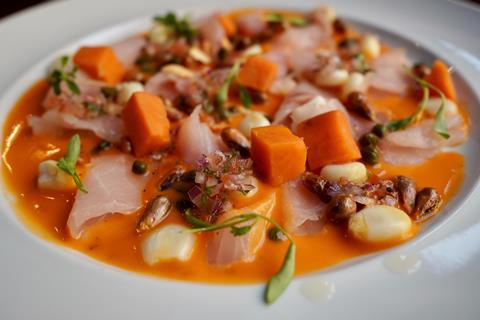Veronica Zundel reflects on her recent enjoyment of Austrian cuisine, and encourages us to celebrate the sense of community surrounding mealtimes

Kaiserschmarrn. Rindsuppe mit Grießknödel. Topfengolatschen. Gurkensalat. Afpelstrudel mit Schlag. The names roll off the tongue as deliciously as the realities roll onto it. I have recently come back from ten days in Austria, revisiting a place I last saw in 1957 when I was four.
It has taken 65 years of repeated visits to realise that there is one thing that binds all my trips and constitutes the chief highlight of them: the food.
I wasn’t vegetarian when I first went, and am now (apart from the Rindsuppe, which is beef consommé but irresistible), but, even without the meat, I would maintain that the Austrian cuisine is the best in the world. But then what would you expect in the most beautiful country in the world? (Biased? Moi?).
Every time we go (every two or three years), we bring back samples of things we can’t easily get here in the UK: Kremser mustard, creamed horseradish (so much tastier than the British sort), Mozartkugel chocolates.
Is it gluttony to lust so after these delectable treats? I don’t know. The great speaker and writer John Bell has a talk entitled ‘Jesus was a fat man’, in which he questions the lean and hungry image we have created of our redeemer.
Jesus, he argues, was constantly invited to dinner, often at rich people’s houses (where he scandalised them by welcoming considerably less rich and respectable people).
Nearly all of his significant interactions happened over meals, and his constant image for the kingdom of God was of a feast – if he wasn’t a little overweight, it was only because of the amount of walking he did from town to town, across the country. He even described doing his Father’s work as food (see John 4:34).
Enjoying communal mealtimes
It is impossible to describe Jesus as in any way spartan or puritan about food. True, he encouraged his disciples to fast, but not to make a show of it to enhance their holiness in front of others.
We have every reason to believe he enjoyed his food, and that fasting during his 40 days in the wilderness was a real trial. And how did he instruct his disciples to remember him after he had gone? He told them to celebrate him with a meal.
I heard of a church that had the slogan: “No meeting together without eating together.” Meals are a way we can relax together (unless you are an over-ambitious cook!), acknowledge our common humanity and need of sustenance, break social barriers and create community.
During the pandemic we lost the habit of inviting others over for a meal, but I do hope we can regain it. The food doesn’t have to be expensive or elaborate (it doesn’t even have to be Austrian!); the important thing is not so much pleasing our palate, though that’s a bonus, but welcoming our guests and meeting their needs.
For years my Mennonite church met once a month for a simple meal of baked potatoes, cheese and salad, followed by fruit, with communion between the two courses and prayer shared together afterwards.
There was nothing fancy about the food, but it was some of the best I ever tasted because I ate it with deeply loved friends. Yes, it’s nice to have something rare and unusually tasty at times, but less is more, because if we ate it all the time, it would no longer be special.
Keeping a right perspective
On the last day of our latest holiday, I ate perhaps my best-ever Kardinalschnitte, a confection of sponge fingers, soft meringue, whipped cream and fruit mousse. I savoured every mouthful – the experience was practically orgasmic.
Was that a sin? Globally speaking, perhaps it was, given that much of the world is starving and that there are hungry children even in our own country.
But eating that patisserie won’t prevent me giving money to development charities, or campaigning for a system where food banks are no longer needed. And as Sir Toby Belch says in Twelfth Night: “Dost thou think because thou art virtuous there shall be no more cakes and ale?”
The Bible is never negative about food, only about depriving people of it. Ecclesiastes tells us: “A person can do nothing better than to eat and drink and find satisfaction in their own toil” (2:24).
And the Song of Songs uses food as a driver and a metaphor for romantic love: “Let him lead me to the banquet hall, and let his banner over me be love” (2:4). Yes, like all of God’s good gifts – land, the body, sex – food can be misused.
But every time I go past my local Tube station and see a handbill that says “Kick the eating habit”, I think: “How Pharisaic can you get? I won’t be kicking that habit any time soon.”

































